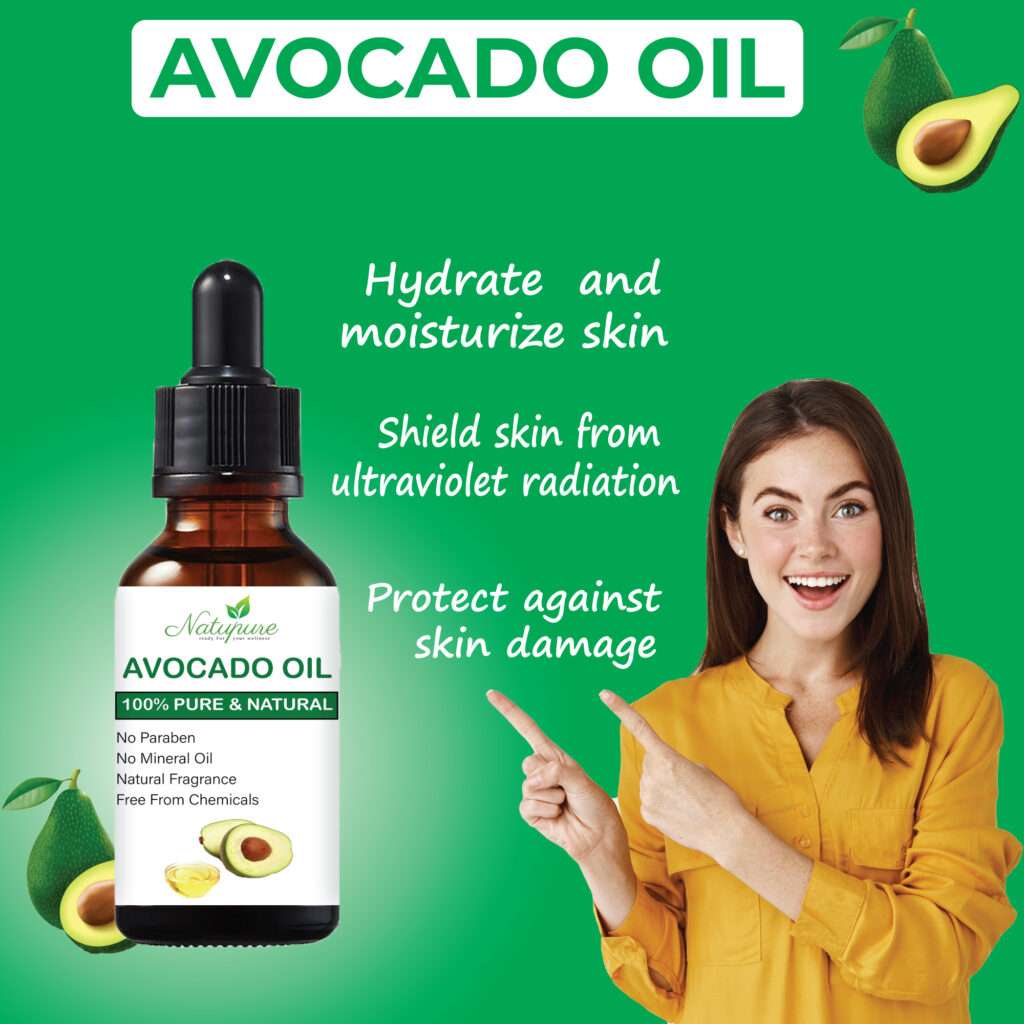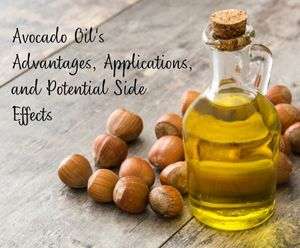Avocado Oil’s is known for its nourishing effects and can be found in many products. Avocado oil is obtained from the pulp of the avocado fruit. After separating the pulp from the fruit, the oil is usually extracted by cold pressing. This vegetable oil is usually extracted from Hus and Persea americana avocados. Avocado oil is a unique oil produced from the fruit itself. Most plant-based oils are extracted from seeds. It provides all the essential nutrients and minerals that are good for one’s health.
Avocado Oil’s is high in heart-healthy fats. These fats are monounsaturated, polyunsaturated, and have a lower saturated fat content. As a result, avocado oil and olive oil are nutritious choices for maintaining cardiovascular health. Furthermore, people with diabetes can consume avocado oil in moderation. This is due to its low glycemic index and lack of carbohydrates. Avocado oil also contains vitamins E and A, which aid in the nourishment of the body’s internal system.

Avocado oil has a number of health benefits. For example, it lowers cholesterol and blood pressure, aids in detoxification, treats skin problems, improves nutrient absorption, and so on. Furthermore, it may help to prevent cancer, nourish hair, and control inflammation. Avocado contains vitamins A and E, which nourish and repair the skin barrier.
A variety of Avocado Oil’s
People obtain avocado oil using the cold press technique. The fruit’s pulp is first pressed, and then the water and particles are separated before spinning to extract the oil from the fruit. The two primary varieties of avocado oil are virgin and refined.
Virgin oil, also referred to as “extra-virgin,” is the purest type of oil that is extracted during the first pressing of the pulp. The process of further filtering crude oil to completely remove all contaminants and tiny particles results in refined oil. In this process, the original green colour of the oil and the authentic flavour also get eliminated.
Both forms of avocado oil have a high smoke point. The smoke point of refined avocado oil is 520°F, compared to 480°F for extra virgin oil. The term “smoke point” describes the point at which an oil component begins to degrade and smoke. Avocado oil is mostly used as a salad and culinary dressing. However, because it is more expensive and only comes in little amounts, people don’t often utilise it for cooking.
Avocado Oil’s Food Value
- Energy: 884kCal
- Fat: 100g
- Protein: 0g
- Carbohydrate: 0g
- Saturated Fatty Acids: 11.6g
- Monounsaturated Fatty Acids: 70.6g
- Polyunsaturated Fatty Acids: 13.5g
Benefits of Avocado Oil’s for Health
The main component of avocado oil is a fatty acid that is good for your heart. It doesn’t include any carbohydrates either. Avocado oil is one of the healthiest vegetable oils that we may utilise because of its nutritional makeup.
1.Excellent for Heart Health
Avocado oil contains approximately 70% monounsaturated fats. It contains 12% saturated fat and 13% polyunsaturated fat. As a result, it is a heart-healthy oil that reduces the risk of several heart diseases. It has a zero glycemic index and no carbohydrates, making it a diabetic-friendly oil.
2.Aids in the repair of skin damage
Avocado oil is high in antioxidants such as beta-carotene, lutein, protein, lecithin, omega fatty acids, and vitamin E. These antioxidants aid in the repair of damaged skin by strengthening the skin barrier. Furthermore, avocado oil nourishes the skin and protects it from UV rays. UV rays from the sun can cause severe damage, including skin cancer.
According to one study, when combined with vitamin B12 cream, avocado oil can result in better and faster psoriasis treatment than standard vitamin B12 therapy. Furthermore, avocado oil aids in the healing of scars and wounds. It contains potassium and lecithin, both of which aid in the formation of new skin cells.
Avocado oil is a well-known wrinkle-reducing ingredient. It also aids in the prevention of premature ageing. Avocado oil contains vitamins A and E, which nourish the skin and stimulate collagen production, resulting in younger-looking skin.
Comedogenicity refers to an ingredient’s proclivity to clog our pores. Avocado oil, for example, has a comedogenic rate of 3. This means avocado oil is slightly heavier on the skin and does not clog pores. It may, however, cause clogged pores in some skin types. Avocado oil helps to brighten skin, despite the fact that its skin lightening properties have not been proven.
According to another study, the linoleic acid, oleic acid, and monounsaturated fatty acids in avocado oil can speed up wound healing.
3.Promotes Hair Growth
Avocado oil is high in vitamin E, making it useful for nourishing and moisturising the scalp. It also aids in the treatment of dandruff.
As a result, it reduces hair breakage and prevents hair damage. Furthermore, avocado oil is regarded as an excellent hair conditioner, particularly for protecting against dry environments and sun damage.
Avocado oil moisturises and nourishes the scalp. Furthermore, it aids in the control of oil overproduction by sending signals to the oil glands to produce the required amount of oil for the scalp.
4.Assists with weight loss
Avocado oil is high in monounsaturated fats and oleic acid, which aid in the reduction of belly fat and the risk of metabolic syndrome. Weight loss may be hampered by metabolic syndrome.
According to a survey, eating half an avocado can reduce the risk of metabolic syndrome by 50%. Furthermore, including avocado oil in your diet can improve the quality of your diet. Avocado oil also contains monounsaturated, polyunsaturated, and saturated fats. As a result, it aids in the absorption of nutrients and fat-soluble carotenoids, which aids in weight loss.
Avocado oil also aids in metabolism enhancement. A fast metabolism aids in weight loss by converting food into energy more quickly.
Uses for Avocado Oil’s
Avocado oil can be used in a variety of ways. You can incorporate them into your diet or use them as a skincare ingredient. You can also use it to get naturally soft hair.
Avocado Oil’s and Skin
Avocado oil can be used in a variety of ways in your skincare routine. You can, for example, massage it into your skin, rub it on your face, or mix it into your bathing lotion.
- After a shower, massage some avocado oil into your skin. You can use avocado oil on its own or mix it into one of your body lotions.
- Avocado oil and other essential oils can be combined to create a moisturising oil. For example, take avocado oil and combine it with a nourishing oil. Then, add a few drops of any essential oil, such as lavender, to the mixture. Apply this mixture to your face as a moisturiser or to your hands and feet as a moisturiser.
- Avocado oil can also be used to treat wrinkles.
Using Avocado Oil for Hair
Avocado oil can be used in a variety of ways to improve the health of your hair. You can use it as a hair mask or hot oil therapy, for example. It also serves as a carrier for essential oils. So you can combine essential oils such as lavender, peppermint, and others and apply the mixture to your hair to promote hair growth. You can also apply avocado oil evenly to the roots of your hair and leave it for a few minutes.
Avocado Oil’s Culinary Applications
- One of the simplest ways to get started with avocado oil is to substitute it for olive oil when roasting. To begin, season sliced root vegetables such as carrots, potatoes, and turnips with salt, pepper, and your favourite seasonings.
- Avocado oil can be used as a salad dressing. It adds a bright and refreshing flavour to any bowl of mixed greens.
- Avocado oil can be used to marinate fish, chicken, steak, or mixed vegetables. Avocado oil, on the other hand, has a milder flavour than other flavoured oils. As a result, it is best if you prefer a milder flavour.
Other Applications
- If you want to keep your baby away from artificial products, avocado oil can be a great substitute for conventional diaper rash creams. Rub a little of the oil into the irritated area to help it heal.
- An great leather conditioner is avocado oil. As a result, you can use it to give your shoes, belt, and other leather accessories new shine.
Unopened avocado oil can be kept for up to a year in a cold, dark location. Likewise, unrefrigerated storage of open avocado oil for up to 6 months is possible.
Avocado Oil’s Potential Negative Effects
- Excessive consumption of avocado oil may cause allergic reactions such as itching, redness, eczema, and hives in some people with sensitive skin. As a result, you should always consume it in moderation. Avoid using avocado oil if you are allergic to vegetable oils.
- When hypersensitive people consume avocado oil, they may experience allergic reactions such as vomiting.
- When breastfeeding mothers overeat avocado, it disrupts their babies’ digestion.
- Excessive avocado consumption may result in mouth allergies such as itching and swelling. As a result, you should only consume it in the amounts recommended.
- Excessive avocado consumption may cause stomach upset and gastrointestinal irritation.
- Mexican avocado, which contains estragole and anethole, may cause cancer. As a result, people with liver disease should avoid it because it may aggravate their condition.
Possible Alternatives to Avocado Oil
Avocado oil is a beneficial addition to your diet that has many health benefits. It could not, however, be a fixture in your diet because it is very pricey. As a result, people prefer to use alternative healthy oils instead of avocado oil.
Olive Oil
Avocado oil and olive oil have nutritional profiles that are very similar. Both oils are high in unsaturated fats, making them ideal for improving heart health. They both contain the same amount of saturated fat and are composed of oleic acid. Avocado, on the other hand, contains less vitamin E than olive. Avocado oil also has a higher smoke point than olive oil.
Coconut Oil
Avocado oil contains more antioxidants than coconut oil, such as thiamine and riboflavin. Avocado and coconut oil are both plant-based oils with high smoke points. The controversy revolves around its fat content – coconut oil, which is almost entirely made up of saturated fatty acids. The saturated fats in coconut oil, on the other hand, are composed of medium-chain triglycerides (MCTs), which are easier for your body to burn off than the long-chain triglycerides found in animal fats. MCTs from coconut oil improve gut health by encouraging the growth of beneficial bacteria and increasing “good” HDL cholesterol.
Conclusion
Avocado oil contains a lot of monounsaturated and polyunsaturated fats. Because of these fats, it is heart-healthy. It can be stored in a cool, dry place away from the sun for up to 12 months. It also contains vitamin E and antioxidants. As a result, avocado oil has a variety of health benefits, including improved heart health, skin health, hair health, and weight loss.
Avocado oil has many incredible health benefits, but it can also cause allergic reactions, mouth allergies, gastrointestinal irritation, and liver damage. There are also some precautions you should take when consuming avocado oil. Pregnant and breastfeeding women, for example, should avoid it. Furthermore, people who are hypersensitive to avocado oil should avoid it.
Frequently Asked Questions
Q1: Can avocado oil be used in cooking?
A1: Avocado oil is great for cooking. It has a high smoke point, which means it can withstand higher temperatures without decomposing and emitting harmful compounds. It can be used in a variety of cooking methods, including frying, sautéing, and roasting.
Q2: Can avocado oil be used to moisturise the skin?
A2: Without a doubt! Avocado oil’s moisturising properties make it popular in skincare products. It can nourish and hydrate the skin while also improving elasticity and reducing dryness. It’s a common ingredient in creams, lotions, serums, and facial oils.
Q3: Is there any health benefit to using avocado oil?
A3: Yes, avocado oil has a number of health benefits. It contains monounsaturated fats, which promote heart health by lowering bad cholesterol and increasing good cholesterol. Avocado oil contains important nutrients such as vitamin E, potassium, and antioxidants. It may be beneficial to skin health, aid in nutrient absorption, and have anti-inflammatory properties.
Q4: Does avocado oil aid in weight loss?
A4: Avocado oil, when consumed in moderation, can be beneficial for weight management. The healthy fats and fiber in avocado oil can promote satiety, reduce appetite, and support a balanced diet. However, it’s important to be mindful of portion sizes, as avocado oil is calorie-dense.
Q5: Can avocado oil be used to care for one’s hair?
A5: Avocado oil is frequently used in hair care products. It can help to moisturise and nourish the hair while also promoting shine and reducing frizz. Conditioners, hair masks, serums, and other hair care formulations contain avocado oil.
Q6: Does avocado oil pose any risk of allergic reactions?
A6: Some people are allergic to avocados, and some people are allergic to avocado oil. Skin rashes, itching, swelling, and difficulty breathing are all examples of allergic symptoms. If you have a known avocado allergy, you should avoid using avocado oil.
Q7: Does avocado oil have any drug interactions?
A7: Avocado oil supplements may interact with certain medications, such as blood thinners. If you are taking any medications, it is advisable to consult your healthcare provider before using avocado oil as a supplement to ensure there are no potential interactions.



